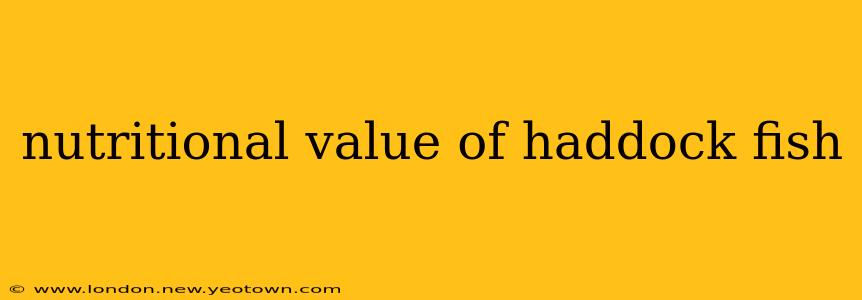Haddock, a flaky white fish often found on dinner plates worldwide, is more than just a delicious meal. It's a nutritional powerhouse packed with essential nutrients that contribute to overall health and well-being. Let's dive into the fascinating world of haddock nutrition and explore why this fish deserves a prominent place in your diet.
My journey into understanding the nutritional benefits of haddock started with a simple question: what makes this fish so special? My research led me to discover a wealth of information, which I'm eager to share with you. I’ll be covering many frequently asked questions to provide a complete picture.
What are the key nutrients found in haddock?
Haddock is an excellent source of high-quality protein, crucial for building and repairing tissues. It's also remarkably low in fat, making it a perfect choice for those watching their weight. But the benefits extend beyond protein and fat content. Haddock is rich in several essential vitamins and minerals, including:
- Vitamin B12: Essential for nerve function and red blood cell formation.
- Selenium: A powerful antioxidant that protects cells from damage.
- Niacin (Vitamin B3): Plays a vital role in energy metabolism.
- Phosphorus: Important for bone health and energy production.
- Potassium: Helps regulate blood pressure.
- Omega-3 Fatty Acids: These healthy fats are known for their anti-inflammatory properties and positive effects on heart health. While not as abundant as in some other fatty fish like salmon, haddock still provides a valuable contribution.
How does haddock compare to other fish nutritionally?
Compared to other white fish, haddock holds its own. While it may not have the same high omega-3 content as oily fish, its lean protein profile and rich vitamin and mineral content make it a valuable addition to a balanced diet. Think of it as a versatile and nutritious option, perfect for a variety of dishes. The lower fat content also makes it a healthier option for some individuals compared to richer fish.
Is haddock a good source of protein?
Absolutely! Haddock is an exceptional source of lean protein. Protein is essential for building and repairing tissues, making it crucial for muscle growth, immune function, and overall health. A serving of haddock provides a significant portion of your daily protein needs, especially beneficial for athletes and individuals striving to maintain or increase muscle mass.
What are the health benefits of eating haddock?
The nutritional profile of haddock translates into a range of health benefits:
- Heart Health: The omega-3 fatty acids and low fat content contribute to heart health by reducing inflammation and improving cholesterol levels.
- Brain Function: Vitamin B12, crucial for nerve function, supports cognitive health and may help protect against age-related cognitive decline.
- Strong Bones: The presence of phosphorus and vitamin D (depending on preparation method and exposure to sunlight) promotes strong and healthy bones.
- Improved Immune System: Selenium acts as a powerful antioxidant, protecting cells from damage and strengthening the immune system.
How much haddock should I eat per week?
Dietary guidelines recommend consuming at least two servings of fish per week. A serving of haddock typically ranges from 3-4 ounces (85-115 grams). Including haddock as part of your weekly fish intake can contribute significantly to your overall nutrient intake.
Are there any potential downsides to eating haddock?
While generally safe and beneficial, there are a few things to consider:
- Mercury Levels: Like other fish, haddock may contain traces of mercury. However, the levels are generally considered low and pose minimal risk to most individuals. Pregnant women and young children should still exercise caution and consult with their doctor.
- Allergies: Some individuals may have an allergy to haddock or other fish.
Conclusion: A Delicious and Nutritious Choice
Haddock offers a delightful combination of taste and nutrition. Its rich profile of protein, vitamins, and minerals makes it a valuable addition to a balanced diet, contributing to overall health and well-being. So next time you're planning a meal, consider incorporating this delicious and nutritious fish. You won't be disappointed!

